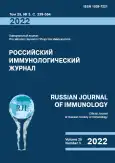Тучные клетки как биомаркеры "inflamm-ageing"
- Авторы: Садек А.1, Храмцова Ю.С.2, Юшков Б.Г.2
-
Учреждения:
- ФГАОУ ВО «Уральский федеральный университет имени первого Президента России Б.Н. Ельцина»
- ФГБУН «Институт иммунологии и физиологии» Уральского отделения Российской академии наук
- Выпуск: Том 25, № 3 (2022)
- Страницы: 299-304
- Раздел: КРАТКИЕ СООБЩЕНИЯ
- URL: https://journal-vniispk.ru/1028-7221/article/view/120203
- DOI: https://doi.org/10.46235/1028-7221-1107-MCA
- ID: 120203
Цитировать
Полный текст
Аннотация
Считается, что большинство механизмов старения в той или иной степени связаны с воспалением. С возрастом развивается уникальная форма хронического воспаления – "inflamm-ageing". Механизм развития этого явления на сегодняшний день до конца не ясен из-за отсутствия надежных критериев его оценки. Одной из систем, участвующих в ускорении возрастных изменений в организме, является иммунная система. Она же принимает непосредственное участие в процессе воспаления. В патогенезе последнего одно из центральных мест занимает реакция тучных клеток. Особого внимания заслуживает роль тучных клеток в ремоделировании тканей, что является основной характеристикой проблем старения. Таким образом, процесс старения может повлиять на функцию тучных клеток, а тучные клетки, в свою очередь, могут ускорить процесс старения, что в итоге и приведет к развитию различных возрастных заболеваний. Все это дает основание рассматривать "inflamm-ageing" в качестве одного из показателей старения, а тучные клетки как индикатор этого процесса. С целью проверки предложенной гипотезы проведено исследование по определению возрастных морфофункциональных изменений популяций тучных клеток в различных органах у крыс. На разновозрастных (4 месяца и 2 года) крысах самцах линии Wistar проведена оценка морфофункциональных параметров тучных клеток (количество, синтетическая и функциональная активность, степень созревания) в разных органах животных. В тимусе, надпочечниках и коже с возрастом наблюдается снижение количества тучных клеток и их синтетической активности при значительном повышении их функциональной активности. В желудке, тонком и толстом кишечнике при неизменном количестве тучных клеток отмечается снижение их синтетической и увеличение функциональной активности. Данные изменения приводят к увеличению среднего размера кровеносных сосудов в исследуемых органах. Печень – единственный орган, в котором с возрастом не происходит изменений тучных клеток. При старении наблюдается тенденция увеличения количества незрелых тучных клеток в органах, что указывает на снижение скорости их созревания. Таким образом, в процессе старения происходят изменения количественных и качественных показателей тучных клеток в различных органах у животных. При этом наибольшие изменения наблюдаются в органах, непосредственно участвующих в стресс-реакциях. Данные изменения тучных клеток играют важную роль в формировании феномена "inflamm-ageing", которое происходит при старении, т. к. данные клетки являются неотъемлемым компонентом воспалительных реакций. Развитие этого феномена приводит к накоплению цитокинов и провоспалительных медиаторов в тканях, которые, в свою очередь, и активируют тучные клетки. В то же время повышенная дегрануляция мастоцитов может усиливать процесс "inflamm-ageing". Отмеченное взаимное влияние тучных клеток и "inflamm-ageing" дает возможность рассматривать мастоциты в качестве потенциальных кандидатов в биомаркеры "inflamm-ageing".
Ключевые слова
Полный текст
Открыть статью на сайте журналаОб авторах
А. Садек
ФГАОУ ВО «Уральский федеральный университет имени первого Президента России Б.Н. Ельцина»
Email: hramtsova15@mail.ru
аспирант
Россия, ЕкатеринбургЮ. С. Храмцова
ФГБУН «Институт иммунологии и физиологии» Уральского отделения Российской академии наук
Автор, ответственный за переписку.
Email: hramtsova15@mail.ru
к.б.н., старший научный сотрудник лаборатории иммунофизиологии и иммунофармакологии
Россия, ЕкатеринбургБ. Г. Юшков
ФГБУН «Институт иммунологии и физиологии» Уральского отделения Российской академии наук
Email: hramtsova15@mail.ru
д.м.н., профессор, член-корр. РАН, заведующий лабораторией иммунофизиологии и иммунофармакологии
Россия, ЕкатеринбургСписок литературы
- Baldwin A.L. Mast cell activation by stress. Mast Cells – Humana Press, 2006, pp. 349-360.
- Franceschi C., Garagnani P., Parini P., Giuliani C., Santoro A. Inflammaging: a new immune–metabolic viewpoint for age-related diseases. Nat. Rev. Endocrinol., 2018, Vol. 14, no. 10, pp. 576-590.
- Franceschi C., Capri M., Monti D., Giunta S., Olivieri F., Sevini F., Panourgia M.P., Invidia L., Celani L., Scurti M., Cevenini E., Castellani G.C., Salvioli S. Inflammaging and anti-inflammaging: a systemic perspective on aging and longevity emerged from studies in humans. Mech. Ageing Dev., 2007, Vol. 128, no. 1, pp. 92-105.
- Legere S.A., Haidl I.D., Légaré J.-F., Marshall J.S. Mast cells in cardiac fibrosis: new insights suggest opportunities for intervention. Front. Immunol., 2019, Vol. 10, 580. doi: 10.3389/fimmu.2019.00580.
- López-Otín C., Blasco M.A., Partridge L., Serrano M., Kroemer G. The hallmarks of aging. Cell, 2013, Vol. 153, no. 6, pp. 1194-1217.
- Magrone T., Jirillo E. The interaction between gut microbiota and age-related changes in immune function and inflammation. Immun. Ageing, 2013, Vol. 10, no. 1, pp. 1-6.
- Montecino-Rodriguez E., Berent-Maoz B., Dorshkind K. Causes, consequences, and reversal of immune system aging. J. Clin. Invest., 2013, Vol. 123, no. 3, pp. 958-965.
- Raica M., Cimpean A.M., Nico B., Guidolin D., Ribatti D. A comparative study of the spatial distribution of mast cells and microvessels in the foetal, adult human thymus and thymoma. Int. J. Exp. Pathol., 2010, Vol. 91, no. 1, pp. 17-23.
- Simon A.K., Hollander G.A., McMichael A. Evolution of the immune system in humans from infancy to old age. Proc. Biol. Sci., 2015, Vol. 282, no. 1821, 20143085. doi: 10.1098/rspb.2014.3085.
- Wang Z., Wang Y., Bradbury N., Gonzales Bravo C., Schnabl B., di Nardo A. Skin wound closure delay in metabolic syndrome correlates with SCF deficiency in keratinocytes. Sci. Rep., 2020, Vol. 10, no. 1, pp. 1-12.
- Yu Y., Daly D.M., Adam I.J., Kitsanta P., Hill C.J., Wild J., Shorthouse A., Grundy D., Jiang W. Interplay between mast cells, enterochromaffin cells, and sensory signaling in the aging human bowel. Neurogastroenterol. Motil., 2016, Vol. 28, no. 10, pp. 1465-1479.
Дополнительные файлы








